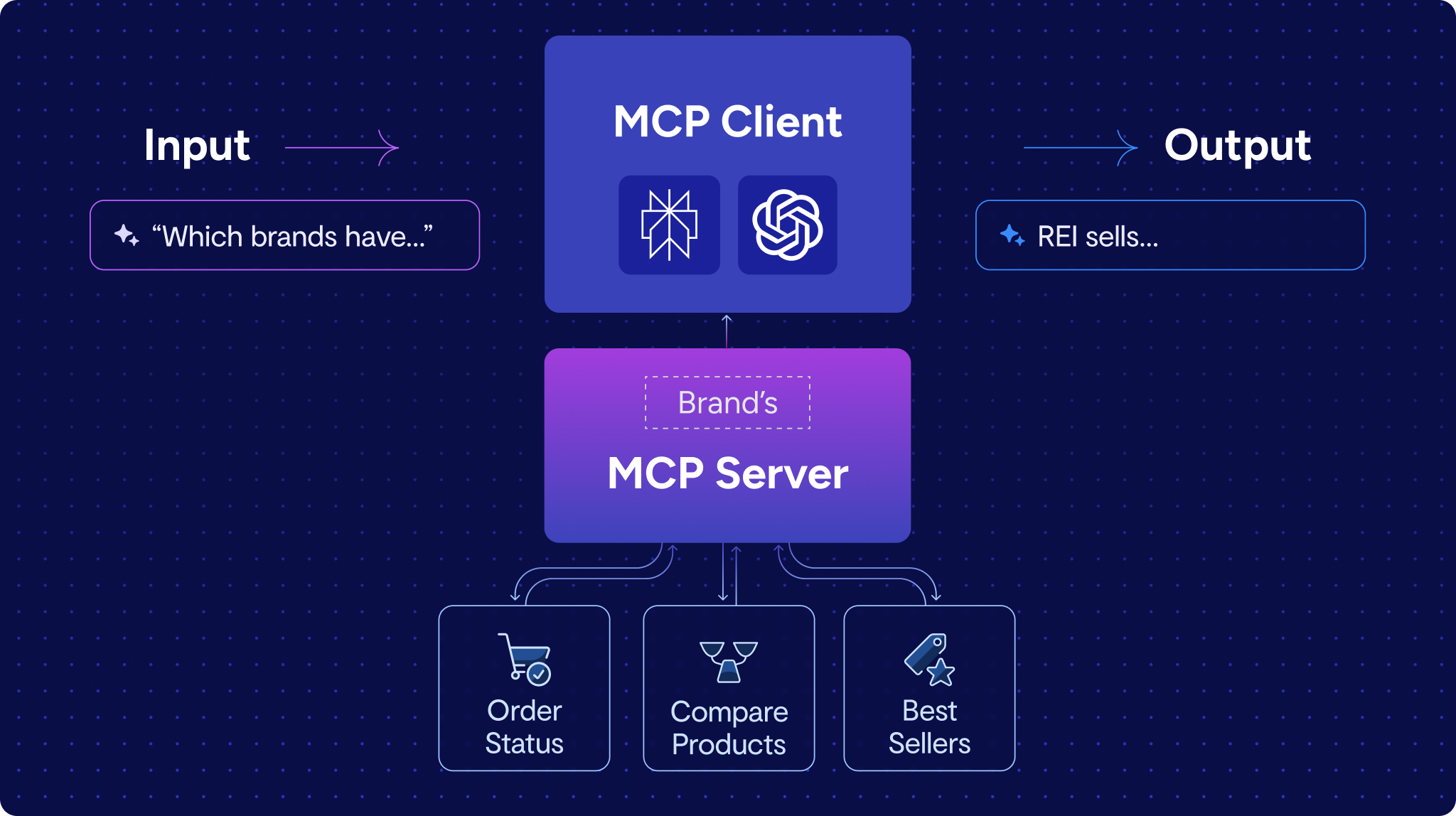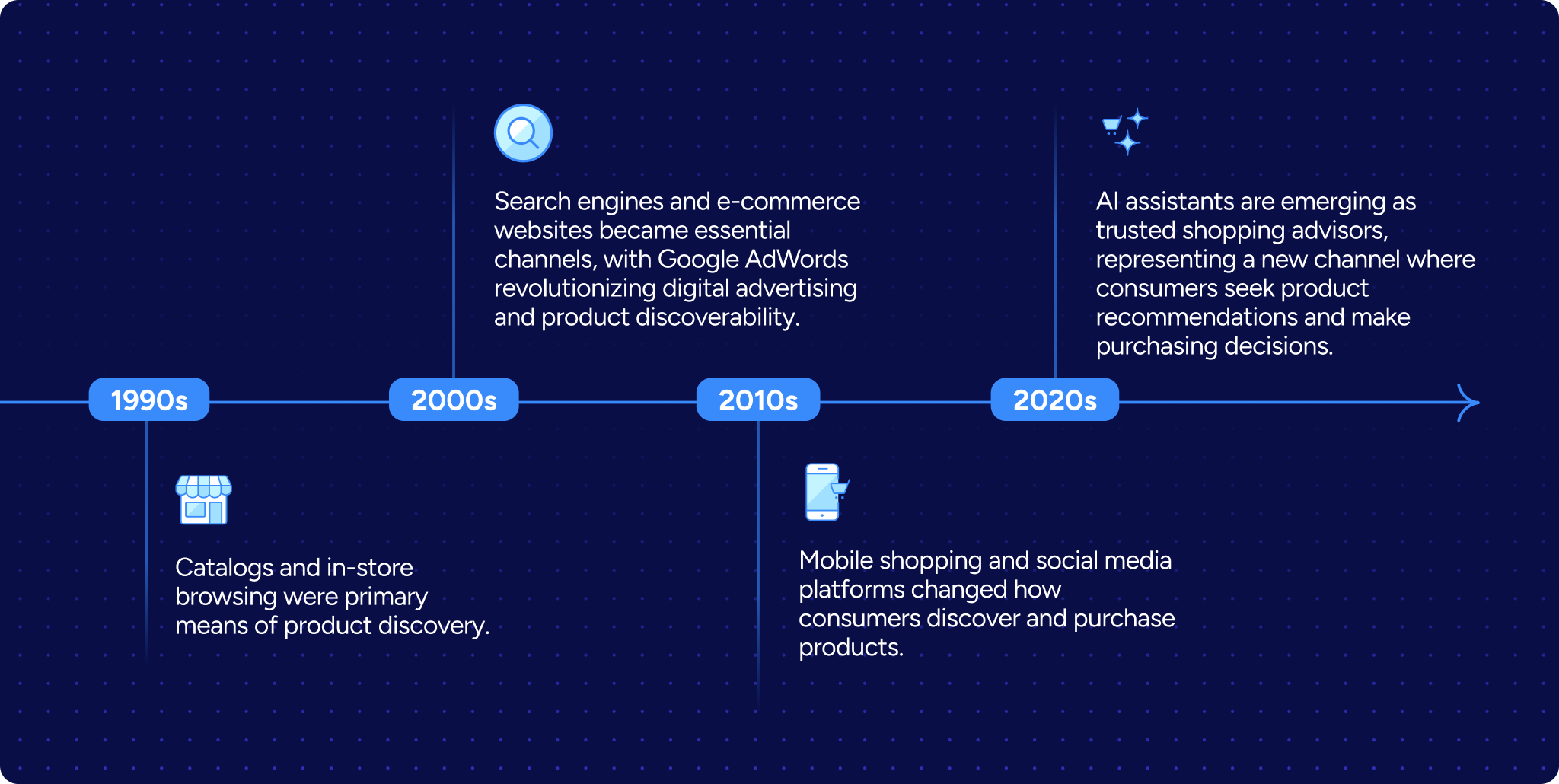Why every retailer needs an MCP server (and what that even means).
If you've tried shopping lately by chatting with an AI tool like ChatGPT or Perplexity, you may no longer be part of the tech-forward majority. Shoppers are increasingly skipping Google searches and brand websites, instead chatting directly with consumer AI assistants to find what they need.
In fact, 34% of consumers would consider letting an AI assistant purchase (not just shop) on their behalf.
The catch? If those AI assistants can't access your real-time inventory and prices, you might as well be invisible.
That's where something called the Model Context Protocol (MCP) comes in. And if you're in retail, it's probably a good idea to get familiar.
What the heck is MCP (and why should you care)?
Let's simplify in a retail context: MCP is a new standard for letting your ecommerce site (think product catalog, sizing, return policies) chat directly with consumer AI assistants like ChatGPT, Claude, and Perplexity. It's basically an instructional manual for how an AI assistant should interact with your store and any backend systems behind it.
Right now, when you ask ChatGPT something like, "Where can I get a blue summer dress under $50?", it scrapes whatever info it can find floating around the internet. Usually, that info is outdated or incomplete.
But imagine if ChatGPT could instead instantly see:
- Exactly which retailers have blue dresses available right now, in the shopper's size
- Current, accurate prices including any promotions or flash sales happening today
- Precise info about materials, shipping options, and even delivery times
With MCP, that's exactly how shopping can, and soon will, work. The AI assistant becomes a reliable shopping companion with real-time access to your entire product catalog.
Without MCP? Even if you have exactly the product people want, your shoppers might never see it.
The real-world problem MCP solves
All this might sound a bit abstract, so let's illustrate the shopper experience when an AI agent recommends your brand, with and without an MCP server.
Imagine a customer asks ChatGPT, "I need waterproof hiking boots I can pick up today."
Without MCP:
ChatGPT might say something vague like, "Bass Pro Shops or REI usually stock those, but call ahead to check." The customer is left doing all the work, possibly abandoning the purchase entirely.
With MCP:
ChatGPT responds precisely with, "Bass Pro Shops downtown has Columbia Newton Ridge boots, sizes 8–12, for $89.99 (20% off today only). REI has Merrell Moab 2 boots in sizes 7, 9, and 10–13, priced at $149.99. Both are available for pickup within an hour. Would you like directions to either store?"
For retailers, this could translate into:
- Improved visibility at key decision moments: Your products can surface when customers express clear buying intent, rather than solely relying on website visits or general web searches.
- Reduced risk of disappointing shoppers: By giving AI assistants real-time access to your inventory data, customers are less likely to encounter frustrating "out-of-stock" surprises.
- Timelier communication of deals: Time-sensitive offers, like sales or new arrivals, could potentially reach shoppers more quickly through AI assistant recommendations.
- Richer product information for shoppers: AI assistants may present detailed product insights, such as materials, specs, and reviews, which could help customers feel more informed and confident in their buying decisions.
Without an MCP server, even your best marketing efforts can be undermined by outdated or incomplete information in AI assistants. With it, you could create a direct channel to millions of customers at the exact moment they're ready to buy.

But how does MCP actually work?
Let's say your brand has an MCP server. Here's how it would work:
- Someone asks their LLM of choice (ChatGPT, Perplexity, Claude, etc.) about your products.
- The assistant checks your MCP server to see what info is available.
- Your MCP server tells the AI how to ask correctly (like giving product IDs and locations).
- The assistant asks your system for specific details.
- Your system provides real-time, accurate info back to the LLM.
- Customers get immediate, correct answers and your products appear exactly as you intend.
And here's the best part: MCP doesn't force you to rebuild your entire system. You're just adding an extra layer between your brand and the AI Agents, so they can more easily and accurately chat with your existing backend.
The next evolution of consumer shopping behavior

Consumer shopping patterns have evolved dramatically over the decades:
1990s: Catalogs and in-store browsing were primary means of product discovery.
2000s: Search engines and e-commerce websites became essential channels, with Google AdWords revolutionizing digital advertising and product discoverability.
2010s: Mobile shopping and social media platforms changed how consumers discover and purchase products.
2020s: AI assistants are emerging as trusted shopping advisors, representing a new channel where consumers seek product recommendations and make purchasing decisions.
Each shift brought clear winners and losers in the retail space. Just look at Netflix versus Blockbuster: In 2000, Netflix proposed a partnership with Blockbuster to handle their online operations, but Blockbuster declined. By 2010, Blockbuster filed for bankruptcy, while Netflix had transformed into a $28 billion company.
The first-mover advantage: Why retailers who adopt MCP early will win big
Right now, almost no retailers have set up MCP servers. That's great news for anyone who's quick to move. Think back to the early 2000s, when Google AdWords first launched. Clicks cost pennies, competition was slim, and brands that jumped in early dominated the market at a fraction of today's cost. Entire businesses were built on being the first ones there.
Today, MCP adoption is at a similar inflection point.
If you're among the first retailers in your category to implement MCP:
- Your products will be the only ones appearing with accurate, real-time inventory and pricing information when consumers ask AI assistants for shopping recommendations
- You'll gain a near-monopoly on AI-assisted shopping in your category (imagine being the only store in a mall while your competitors are miles away)
- You'll establish your brand as the go-to recommendation in AI systems, potentially creating lasting algorithmic preferences that benefit you for years
This advantage won't last forever. Eventually, MCP will become standard practice for retailers, just as having a website or mobile app is today. But the retailers who move first will have already captured market share, consumer attention, and invaluable data on this emerging channel.
We don’t know exactly how AI shopping will unfold (and that’s the point).
We can’t fully predict all the ways shoppers will adopt AI assistants like ChatGPT, Claude, or Perplexity in the years ahead. Consumer habits shift quickly, new technologies emerge overnight, and the retail landscape continues to evolve unpredictably.
But here's one thing we do know: As shoppers increasingly use AI to discover products, retailers that aren’t easily discoverable, or whose product data isn't accurate and accessible, risk losing a critical connection with their customers.
That's why we’re building a community to help retailers navigate and capitalize on this shift. We’ll be publishing educational content, offering courses, and sharing practical resources designed to help you confidently approach this new era of AI-assisted commerce. If you want to take part, join the conversation.